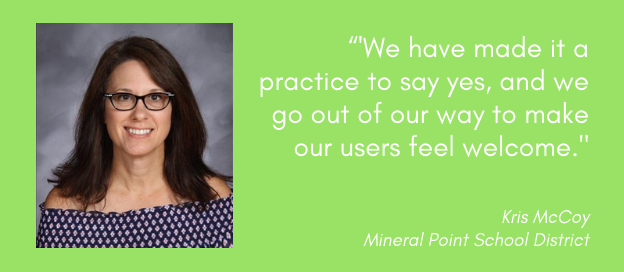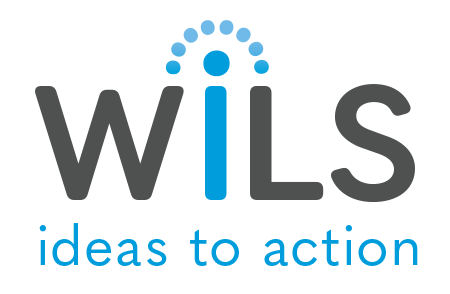
One of our greatest joys at WiLS is hearing our members tell the stories of the big and important work they are doing – interesting new projects or initiatives, or even interesting and new approaches to old projects. And, in addition to hearing about it, it makes us even happier when we can share those stories with other members. Each month, WiLS is proud to feature an interview with one of our library members. This month, we interview Kris McCoy, Instructional Technology and Information Specialist for Mineral Point School District and WiLS Board Member representing K12 libraries!
Why did you, personally, choose to work in libraries?
I ended up in the library by accident! Ten years ago, I thought I wanted to be an English teacher and applied for a position in our high school but was hired for the open library position. After doing much research about the field, working in our school libraries under an emergency license, and taking the required graduate courses, I discovered that working in a school library is the most amazing job. It was a great experience, and our libraries got to be the labs where I could apply all of my learning. What I like about it most is the variety. As the librarian and instructional technology specialist, I get to work closely with teachers and students, explore new resources and tools, troubleshoot on a daily basis, talk books, and have a great excuse to read widely. Plus, the opportunity to work with and learn from others in the field is inspiring. I can’t think of a better job!
What is unique about the culture of your library? How do you influence it?
What’s unique about the culture of our libraries in Mineral Point is the supportive community we live in and how lucky we are to work with a staff and administration at both buildings who embrace and support collaboration and teamwork. In the classroom, this includes co-planning, co-teaching, and sometimes, co-assessing. We also team with staff to offer students additional opportunities such as book clubs, advisory options, maker clubs, special events, reading initiatives, and more. Most importantly, we have developed great relationships and this drives our planning, programming, and acquisitions. We volunteer to take the lead on exploring new resources and emerging technologies that will benefit students and staff and also offer support during implementation. In addition, our libraries are unique in that they are truly multi-purpose spaces that quickly transform to meet the varied needs of our students, staff, and community. The main ways we influence it is that we have made it a practice to say yes, and we go out of our way to make our users feel welcome.
What do you think is important to know about the community you work with? What helps you understand their needs?
It’s really important to know the curriculum and the culture of the school where you work, connect with students to learn their interests, participate on leadership teams, work closely with the various departments, and be active in your community. This involvement helps you better understand their needs and offers opportunities to build relationships. And truly, that is essential for developing a strong school library program.
What big ideas are being worked on at your library? What problems are being solved?
The big ideas we are currently working on focus on collaboration with classroom and content area teachers to improve our reading culture. The library is contributing by increasing the number of book talks, promoting student and staff collection development, facilitating lunch book clubs, and helping classroom teachers find great resources that fit their curriculum. An example of this is after sharing my excitement about one of my summer reads, The Martian by Andy Weir, our chemistry teacher read it and has decided to make it required reading in December for his students. I’m really excited about the potential of using fiction to facilitate greater understanding and build connections.
Other projects we are working on include making the move to genre-fy our fiction, continually tweaking of our space to accommodate the needs of multiple user needs at the same time, and increasing maker space resource use by putting materials out in the library where they are free to explore and easily accessible to all of our study hall students. I guess we are just always experimenting to improve and better meet the needs of our users.
These interviews are part of a series of interviews with both WiLS library and vendor partners. Your feedback is appreciated. If you have any to offer on this article or suggestions for upcoming interviews, contact Andrea Coffin at acoffin@wils.org.
